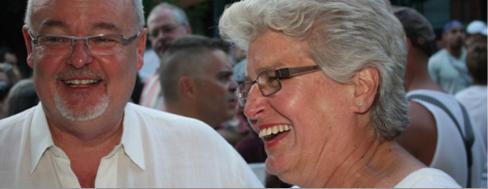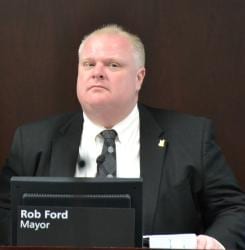
Former Ward 27 councillor Kyle Rae and former mayor Barbara Hall. Credit: File photo
On the 25th anniversary year of sexual orientation being added to the Ontario Human Rights Code (OHRC), former Toronto mayor Barbara Hall recalls marching in the Pride parade as the most “moving experience” of her time as mayor.
Contrast that with news June 22 that current Mayor Rob Ford is refusing to take part, choosing instead to escape the downtown to his cottage in Huntsville for the weekend. Ford also declined to attend the rainbow flag-raising ceremony at city hall on June 27.
Ford may give Pride the snub, but Hall has been a vocal supporter since the OHRC’s landmark decision. Sexual orientation was inserted into the Code on December 18, 1986.
Hall, now chief commissioner of OHRC, tells Xtra she remembers the moment vividly. “Word spread and there were impromptu celebrations at Church and Wellesley,” she says, describing the victory.
The decision came on the heels of the bathhouse raids in 1981, known as Operation Soap. Hall, then a fresh-faced young lawyer, remembers gay activism reached the mainstream following that “atrocious event.” She says she was part of a group of lawyers who provided legal support and services for the hundreds of people who were charged in the raids.
“I witnessed firsthand the terrible impacts that treatment, the outing of people, had on the lives of those involved in the raids,” she says. “Many people lost their jobs and some committed suicide.”
In 1987, Hall proudly marched in the Pride parade. For the first time, gay and lesbian people had the protection of the law. She continued that show of solidarity during her time as mayor, from 1994 to 1997.
“Marching in Pride was the most moving experience in my time as mayor,” she tells Xtra. “I still run into people who tell me about the impact that seeing the mayor of their city marching in Pride had on them. Older people would tell me they have lived in the city all their lives, pay taxes, but never felt a part of the city until the mayor marched in Pride. For the first time they felt included by their city.”
Young people told Hall they called home to tell their parents that the mayor was accepting of gays and lesbians, even if their parents were not. “They said, ‘Someday I hope my mother will accept me the way you do.’ It made me understand how excluded members of the queer community felt and the power of the mayor’s office to send a message and affect public opinion.”
Hall will be marching once again in the 2011 parade with members of the OHRC. On June 23, she will speak at the Pride launch party at the Phoenix about the anniversary of the inclusion of sexual orientation in the Code and the importance of preserving human rights. It is also the 50th anniversary year of the OHRC.
While Canada should celebrate being a human rights leader, Hall reminds that trans people are still fighting for the same legal protections, queer youth face rampant bullying at school, and there’s still widespread social discrimination against all queer people.
“It’s important for people to realize how recent human rights are and how fragile they are,” she says. “It’s important for all of us to be vigilant about rights. They’re never easily acquired. It’s been a struggle that’s put many people at risk, and they are not carved in stone. There are always people willing to take rights away.”

 Why you can trust Xtra
Why you can trust Xtra


